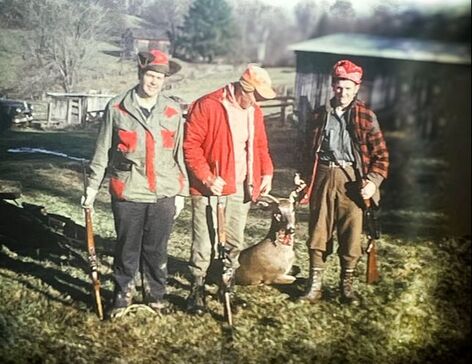 Open the draft on the stovepipe, shake the grate back and forth until you see some hot glowing coals drop into the ash pan, pour a coal bucket full of anthracite coal into the stove’s belly, and close the draft...I tried to give mom a break and “bank” the coal at night when I was home. Dad, unable to do physical work, was still a good supervisor, and his easy chair was positioned so he could watch the red coals drop. You wanted to see enough glowing orange in the ash pan to make room for an ample reload of coal to burn through the night but not too much red or the fire would go out. Long intro to say I know what “coal-fire-orange” looks like and I appreciate it. Today we see this color everywhere and call it “blaze orange”. It’s hard to believe that before the 1930’s our ancestors never saw it on anything other than fire, nor any of its fluorescent siblings like hot pink and safety yellow. The pigments simply didn’t exist! Brothers, Bob and Joe Switzer literally invented the colors when Bob hit his head and had to recover in a dark basement. For entertainment they experimented with a black light and chemicals (eye drops and shellac from the family’s pharmacy) to create glow-in-the-dark and florescent colors which evolved into pigments that didn’t fade and actually glowed in the daylight. They aptly named their company Day-Glo and “Coal-Fire-Orange” debuted on a Sandusky, OH billboard in the 1940’s. Later the color was popularized in product packaging (think Tide) and was even utilized by our military during WWII for visibility and safety communications. Notably nobody embraced fluorescents more than the psychedelic hippies of the 60’s, unless it was their spandex and parachute-pants wearing children in the 80’s. Truth be told most of the people I know in WV have fluorescent clothing hanging in their closet right this very minute. Probably not much spandex (but who knows)—what’s important is the color—Blaze Orange. Because apparently when participating in firearm deer season, they must have 400 square inches of their body covered in it. I can still see my dad back in the day attaching red bandanas to his hat and coat with safety pins, which he vowed met the requirements (?). He’d get his outfit ready the night before so he and his buddies could go hunt together at the crack of dawn. I don’t hunt but I have a hunting buddy—one who texts me from her hunting shanty. I remember vividly the time we were surrounded by a flock of wild turkeys which she described as surreal. I can still hear the wild gobbling ruckus I imagined. Recently her text said a pack of coyotes were howling nearby and I was a bit unnerved by it all. Another time a misty fog rolled in and we hoped her real-life hunting companion would come get her soon before I caught a cold. And then there was the text saying we got an 8 point with her bow-- and boy did we rejoice! Back when she hunted with her husband instead of her phone-a-friend, they were sitting really still waiting. There always seems to be a lot of waiting. Her husband pointed at something he wanted her to see. Her eyes got large and she said, “Are you not afraid?” And he made a face and said, “It’s just a chipmunk!” She then directed his attention to what she was seeing, which from her position was an approaching black bear! To wrap it up, may we have a Father who supervises us, siblings to create with, a friend who texts us from their hunting shanty, and companions who wait with us and warn us of approaching danger. And this Christmas may our attention be focused on celebrating together the birth of Jesus, who through His blood on the cross covers us 100 percent in Safety Red.
2 Comments
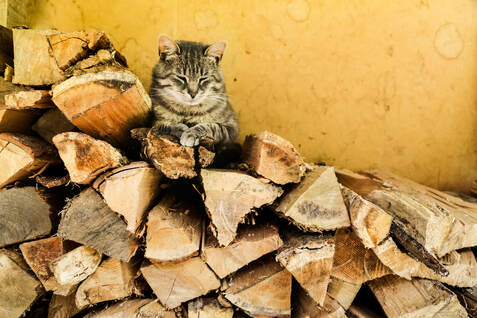 She examined each piece of firewood that she and her sister had split with an axe. There was little rush but much intention. After assessing the size and shape of the piece, she’d carefully place it in just the right hole in the wood rick to balance out the weight or make it level. If the wood was a bit wet and needed to dry out, she’d stack three pieces headed right and then on top of them three facing the back, leaving about three inches of air space between them. Great Aunt Anna Balli sure knew how to stack wood. It was a work of art really. Even long after she was gone, her wood rack stood as a testament to setting high standards. Some years ago I stacked wood on the back porch with a friend. We worked hard and stacked it from floor to ceiling, but unlike Aunt Anna, we executed our task with much rush and little intention….and the next morning we all woke up to see a fallen wood rack. We had to stack it again. Mediocrity has been a growing problem ever since Americans have not had to work so hard to get by and luxuries have come easier. Then in 2020, with the pandemic, it almost became acceptable to do as little work as possible, either in the privacy of work-from-home situations or in public when dedicated employees were hard to find. Now it seems like slackers not only get a free pass but receive a pat on the back just for showing up! Good has become good enough. I’ll admit sometimes I’m a slacker too so I’m not going to throw stones if I live in a glass house. Besides, then I’d have to go get the stones and haul them around. And if my experience of filling potholes with river stones is any indication, throwing rocks is a hot sweaty mess, so I won’t. But admitting a problem is the first step in conquering it, so I’ve compiled a list of clues based on personal experience in an effort to help others. You might be a slacker if you’ve….Gone to the grocery store in your pajamas without a medical excuse. Loaded up on perfume, deodorant, and dry shampoo instead of taking a shower. Taken store bought food to a pot-luck in one of your own pans. Stayed home from church because of a late Saturday night, or because so-and-so might be there, or it’s raining. Posted a prayer hands emoji but forgot to talk to God. Known that something needed to be put back in its place but walked past it for two weeks. Planted but not weeded. Cut once but didn’t measure twice. Or lose hay bales in the river crossing because you did a mediocre stacking job and then didn’t secure the tie down straps on the truck load. There are not many things on earth heavier than a wet hay bale! This Thanksgiving my heart is full of gratitude for people in my life who don’t settle for mediocre. Mom, who asked for an “unspoken prayer” request every Sunday when we girls were growing up. (We just recently learned those prayers were for us.) And Dad who worked in the timber industry outside in the WV elements to provide for us and never complained. I’m also thankful for an exceptional sister who keeps me (and really everyone) grounded, a par excellent husband who is generous and organized., kids who stretch their schedules to spend time with their parents, best friends old and new who pray us through trials and triumphs, brave and smart people who contend for freedom and faith. And it goes without saying (but I’ll say it anyway) the most supreme, non-mediocre person of all is GOD, who when all odds were stacked against us, reached down and rescued us. (Colossians 1:13)  When my husband participated in a Mudathon which included 3 miles of 40 obstacles and a mud trench, I didn’t join him. Cheering him on from the sidelines was my only option because, not to wallow in it, I simply wasn’t ready to run the course. This past August my niece ran a similar Spartan race that also included a mud challenge. She was faced with putting her entire head under the dreadful mire for a short distance OR taking the penalty lap for avoiding said challenge. I’ve thought about this extensively…What would I have done? What would you do? When asked if wearing goggles was an option, she explained how athletes usually avoided anything that would hinder running or achieving success with other obstacles. I read Hebrews 12:1 while still pondering this mud/goggle dilemma: “…let us throw off everything that hinders and the sin that so easily entangles. And let us run with perseverance the race marked out for us.” Sometimes we have to ditch the goggles and sin, boldly put our heads down like my niece did, and keep going. Running the race is easier when we’re not weighed down with habits or thoughts that entangle us. In high school I was on the track team. My race strategy was to stay with the pack and conserve energy until the final sprint at which point I’d dig deep and pass a few runners to the finish line. It never worked very well and while sometimes I’d receive a placement ribbon, I never did win a race. To condition for those track events I’d run around the perimeter of the hayfield on our farm listening to Prince’s Purple Rain album on a Walkman knock-off. I’ve long since traded in my running shoes and the singer formerly known as Prince for a best friend who helps me solve the world’s problems as we walk, which I prefer. People all over the world are obsessed with races. We race cars, horses, goats, dogs, camels, ostriches, water buffalo, and even lawnmowers. At our annual family reunion we take seriously the big finale of racing craw crabs down a church pew. But one of the craziest races ever concocted has to be The Wife Carrying Race in which the man carries his wife upside down on his back with her legs wrapped around his neck. It’s awkward to say the least. As my dad would say, “It’s not how I would have done it.” But hey, Finland has won the title of the happiest place on earth twice so maybe there’s something to it. When someone signs up for a race, they begin training. Had I worked out more, I might have joined my husband in the Mudathon. (He doesn’t know about the Wife Carrying Race and nobody tell him!) The big question is: How are we training? Realistically, if you’re reading this you’re already a participant in a race…the human race. It’s not a sprint but one of endurance, from birth to the end of our days on earth. There are no sideline options so we must condition in order to do it well…the “gym” is our bible and our prayer room. I don’t know who needs to hear it but—persevere! When running our race, sometimes we stumble and some obstacles will be messy. Hebrews 12:2-3 encourages us to “Fix our eyes on Jesus” who endured the cross “so that you will not grow weary and lose heart.” And James 1:12 says, “Blessed is the man who perseveres under trial, because when he has stood the test, he will receive the crown of life that God has promised to those who love Him.” Crossing the finish line and receiving a crown of eternal life?! Isn’t that way better than being rewarded with a medal, a placement ribbon or a t-shirt? All I know is I need to go hit the “gym”… 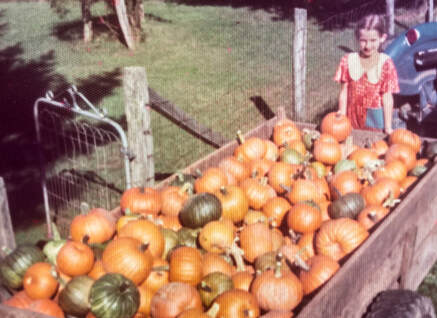 Growing up our parents would rein us in by saying “Don’t put the cart in front of the horse.” In other words, don’t be hasty. Another colorful saying used in our household was “jumping on the bandwagon.” This phrase began decades ago when horse-drawn wagons paraded through towns carrying loud brass bands, getting the attention of anyone within earshot. Usually this wagon accompanied political candidates or traveling circuses (now often indistinguishable). We’ve since adapted the phrase to describe someone committing themselves to a cause as if they’d jumped right on that band-wagon of revelry rolling through the streets. I admittedly have a tendency to get overly excited and jump on a bandwagon before the first song is even finished, only later finding out the music was just noise. Non-musical wagons and carts are necessary for farm work. A scene etched in my memory is Mom and Aunt Hilda stomping a mammoth-size pile of loose hay atop a precarious old wagon on a hill too steep for the baler. Another time we filled up the tractor wagon with cousins cuddled in blankets and set off like pioneers to find a cave way back on the ridge. And the year of the great harvest we replaced the cousins with hundreds of pumpkins! We nearly wore out that old hand-made tractor-wagon getting firewood every spring. In Genesis 22:6-14 young Isaac physically carried the firewood needed for the sacrifice, but in 1 Samuel 6:7-14 God brought the firewood to the people in a cart. It’s a beautiful story about God’s presence returning. The Philistines were instructed to “Get a new cart ready, with two cows that have calved and have never been yoked. Hitch the cows to the cart, but take their calves away and pen them up.” (Any farmer knows if you take cows that just birthed calves and try to send them away from their babies, they would never go in the opposite direction unless it was by God’s doing.) Next we see the cart carrying the Ark of the Covenant go and stop in the field of Joshua where the people were harvesting. They were overjoyed and quit work to offer up a burnt offering using the cows for a sacrifice and the wooden cart for the firewood. May we likewise glorify God with the gifts He brings us. Then there was the wagon recently used as a prop...As they drove along the winding road to the little church in the valley, Pastor Gary talked with his wife, Rebekah, about the sermon he planned to preach a few days later…he also wished he had a wagon to visually explain the main point of the message. When they arrived at the church 30 minutes later, there was a wagon! It was brought by a congregant for another purpose, but it was God who provided. That Sunday Pastor Gary used the wagon to explain the narrow path to life mentioned in Matthew 7:13-14 and how oftentimes we are hauling around things we don’t need…things that weigh us down. But the good news is God will help us get those things out of our wagon if we let him. Sometimes that narrow road also seems to be at an incline and when we have too much “stuff” in our wagon we can begin to back-slide. He wisely cautioned if someone is sliding back farther or faster than we are, we might wrongly feel like we are actually making progress. We need to be mindful of what’s in our wagon. And if you want to know what band-wagon is currently in town, just look at social media and see what new filter people are putting on their profile picture. All band-wagons are fun and loud, but we might not want to put the cart before the horse. Let the song play out and ask ourselves if it’s music to God’s ears before we jump on. 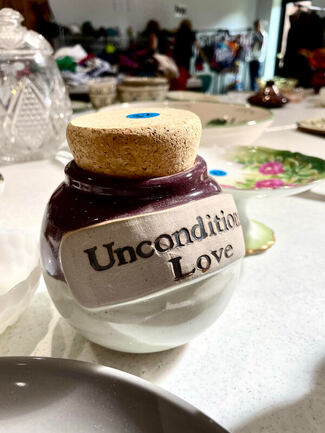 ‘Tis the season! Yard sale season! Last week I pulled into the anticipated annual church rummage sale, wondering if I’d find the very thing I needed (maybe even something I didn’t know I needed until I saw it!) It was merely 15 minutes past opening time and already the parking lot was jam packed and almost everyone inside already! …Everyone except one woman who was actually running towards the entrance. I grinned thinking how we all need to be running towards church and picked up my pace a bit. Inside, friendly volunteers greeted us, and said not to leave until our arms were full. This seemed right as well. I cased the room, a churning sea of treasure hunters. Some kids scurried past with new aliases in wigs they found in the costume area. Men were examining boxes of tools to see if their garage needed something someone else’s didn’t. And the women were all over the place like skilled worker bees. This one needed a black purse, and that one was looking for something blousy. In housewares two college girls were getting a lesson from an older gentleman about a by-gone kitchen relic. I was enjoying their shocked amazement when my eyes landed on the love jar. Indeed, sunlight shown directly through the window, and lighted up the ceramic vessel like it was the Holy Grail. Stamped on the belly were the words “Unconditional Love”. Amazing, in this bubbling sea of humanity and not one person wanted the unconditional love! Equally interesting, obviously someone had possessed the unconditional love, and decided it was time to let it go. To me the jar was a metaphor and I too passed it by because, well, I already had it. Realistically, most material things aren’t as valuable as you might think. Even Hummels, and Beanie Babies won’t gain you a fortune, and we’d be better off collecting moments that are precious than collecting Precious Moments. Often a thing’s only value is sentimental. My hubby, Jeff, figured we’d be able to pay off the house mortgage or at least make a car payment with the sale of his authentic vintage Stewart’s root beer mug. Our yard sale visitors came and went all day, but no one offered to buy the fluorescent orange (plastic) treasure. Deflated Jeff marked it down to a quarter and then two hours later put it in the free box. Some dear friends of ours laugh about going to a garage sale when the family was not actually having a garage sale! They saw the open door and treasures scattered about the lawn so they parked and walked into the garage. The homeowner asked, “Can I help you?“ To which they politely replied “No, thank you we were just looking.” Truth be told I think everyone wants unconditional love, it’s just hard to know where to find it. There has even been some debate as to whether God actually offers us unconditional love. Romans 5:6-8 tells us that Christ died for us while we were still sinners, which seemingly demonstrates that, regardless of our “condition”, God still provides a plan of salvation for us all. This love, of course, does not mean that everyone will go to heaven, because the only door we can enter Heaven through is Jesus Christ and we should be running towards it. And herein lies the second camp of thinkers…while God’s love is unconditional His plan of salvation is not. He actually require us to do two things; repent and accept Jesus as our personal Savior, therefore faithfulness is a “condition”. The indisputable fact is that God loves us whether or not we love Him back. Obviously that kind of love can’t be bought or sold. Still, I can’t help but wonder if anyone left church that day with “Unconditional Love”…because they were looking for just that very thing. 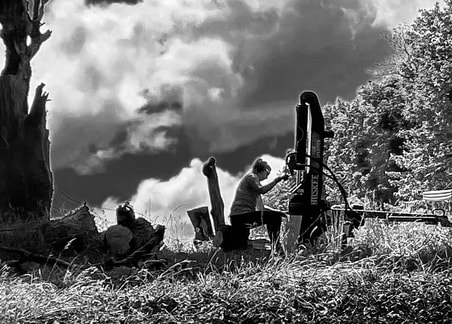 When life gives you a fallen tree, make firewood. It’s an Appalachian twist on the lemons/lemonade mindset. Admittedly, it was daunting staring at the huge trees lying in the field where spring storms had forced them to surrender. How were we ever going to solve yet another challenge added to our lengthy to-do list? My sister Cindy has a saying we often repeat, “God will provide.” And He did yet again. Cousins Chandler and Paula came with their chainsaw, wood splitter, muscle, and motivation. A quote by Henry Ford pretty much summed it up, “Chop your own wood and it will warm you twice.” He sure nailed that one! Many of those logs took two people to wrestle under the blade of the wood splitter, but in a few focused days we worked up enough firewood to keep Mom warm all winter! One thing that nearly broke me though was occasionally a log would crack open under the 28-ton pressure of the wood splitter blade to reveal several hideous flat-headed white worms sticking out of holes. Ugh! It gives me shivers just thinking about them! I wondered how they ever got into the center of the tree, so I looked them up online (which I don’t recommend unless you want to dry heave like a city-slicker). They are called Pacific Flathead Borer Beetle larvae, and the adult insect bores its way into the tree and lays eggs. They are like sin that creeps in and destroys us from the inside. Incidentally, the beetles seek out weakened or stressed trees to invade, which can also true of sin. Mountain people impress me. Firstly none of the others gagged and carried on over the Pacific Flatheads. Secondly, they knew their surroundings…naming trees and how to get them to fall in just the right spot…Oak and Locust are some of the best for firewood, but popular and sycamore aren’t ideal because they don’t produce much heat. I also learned the importance of getting firewood stored up now when winter is still months away, allowing time for the sap to dry out so the wood will be ready when the snow flies. Country folk also possess legendary tenacity and when I was ready to quit with my parched tongue dragging the ground, one of them would say spiritedly, “There’s still some room on the trailer!” I was curious if people split wood in the Bible and sure enough they did. Abraham split wood to take on the mountain for his most obedient burnt offering (Genesis 22:3). And when the Philistines returned the Ark of the Covenant to Israel in a cart drawn by two cows, the people stopped harvesting wheat, chopped up the wood of the cart, and sacrificed the cows as a burnt offering (1 Samuel 6:14). They knew what to do with the gifts God gave them, and used those gifts to praise Him. We can learn a thing or two from these ancient wood splitters. Scripture tells us God Himself did a lot of splitting. He split desert rocks to bring forth water, split water to produce dry ground, and at times split the ground to bring water. Whatever the people needed, He provided. He even split the temple’s curtain of separation! Let’s not split hairs, God sees the sin deep inside us that nobody else sees but sometimes is revealed under pressure…and He provides us with Jesus. We just need to decide what we are going to do with Jesus ASAP or as we say on the farm “lickety split!” because 1 Corinthians 15:52 indicates He will return ”in a moment, in the twinkling of an eye”. Imagine a split-second to change our forever! Let’s remember a double-minded man is unstable in all his ways, so like a good mountaineer, it might pay us to get ready in this season… because there is no time for a split decision.  People are crazy. I stood in a crowd sandwiched together so closely conversations didn’t have boundaries which meant I could eavesdrop without guilt. The man and woman behind me were discussing her dilemma about buying a cat. She had found a breeder but you had to put down $500 to reserve a kitten—and even then you weren’t sure if you were going to get a good one! Her sympathetic companion offered up a less than stellar solution, yet one he was proud of: Why didn’t she just call around and then tell them for $1,200 she could get the exact same cat somewhere else? In my opinion, making a down payment on a cat would be crazy…and $1,200 well, that’s just plumb crazy! I tried not to judge them but was unsuccessful. Admittedly, I have not always made the most intelligent choices either. There was the time in the mid-70’s sister Cindy and I were going to get rich off homemade pet rocks…and once cousin Brenda and I rode the flooded Holly River rapids in tractor tire inner tubes and tube tops… and last year I unknowingly bought my own sweater that I had worn into the Goodwill store. Those three instances just begin to scratch the surface, but recognizing one’s shortcomings is the first step in overcoming them. I need an alarm to go off when the peculiar-meter waivers too close to the “plumb crazy” mark. It’s no surprise we use that phrase often in our family. It’s crazy a few levels past silly. The word “plumb” means spot-on, complete or perfect as in “plumb line”, which is a device stone masons and carpenters use. It’s a lead weight hanging from a string to give them exact measurements when building a wall. I asked a skilled builder why use an ancient tool such as a plumb line instead of a modern bubble level and he said because gravity working with a plumb line would always be perfect and didn’t need calibration adjustments. Can you imagine a guide that never needs adjustments and is always perfect? I need to get one of those! And then I realized that I already have one—the Bible. Humor me a minute. If the Bible is our Divine plumb line, we can hold it up to ourselves and see if we are in line with how God wants us to live. When Cindy and I were kids carrying on too much and it was time to get serious, Mom would tell us to “straighten up!” Sometimes she gave voice to the plumb line. We’ve all seen old neglected barns of past generations that begin to lean. Sometimes it might be easier to knock it over and rebuild, but often they can be restored to their original purpose. Just like those unsafe leaning walls, we can be in danger of hurting those around us when we ignore the Plumb Line, but can be restored with some effort. Most people are familiar with the Leaning Tower of Pisa in Italy. It leans almost 14 feet off plumb. Buildings often lean due to problems with foundations that do not go deep enough or are poorly constructed to cut costs, coupled with unstable shifting ground. I believe the Bible gives us perfect instruction on building a strong foundation to withstand when the world shakes. “So this is what the Sovereign Lord says: See, I lay a stone in Zion, a tested stone, a precious cornerstone for a sure foundation; the one who trusts will never be dismayed. I will make justice the measuring line and righteousness the plumb line…” (Isaiah 28: 16-17) We as a society are all in a twist trying to maintain balance, but the real question is: How do we measure up vertically with the Plumb Line? Do we have a good foundation with a “precious cornerstone”? If I’m getting this straight, to reject the Cornerstone would be…plumb crazy! 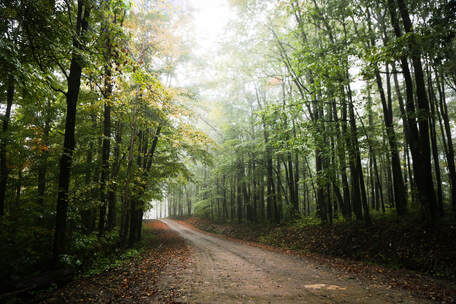 “I come back with increased conviction to those places where I was born, or played as a boy, narrowing my circles like a bird going back to a nest. That seems to me the end of all travel, and especially the wildest travel, to get home.” (G.K. Chesterton) Dusk came early one evening years ago and caught two young girls by surprise. Mom and Aunt Hilda had been at a neighbor’s house almost a mile down the road playing with their friends when they remembered they still had to walk home. They knew the road well, but now it was getting dark and since they had no flashlight, their only hope was to rely on their memory and the scarce light offered up by the moon. Adding to the danger, the neighbors had sent with them a generous bag of meat to give their mom. They set off into the night carrying the ‘unintentional bear bait’ between them. It wasn’t long before fear gripped them as they thought some kind of wild animal was actually chewing at the bag. They didn’t dare look back in fear of what they might see. Both girls were terrified, but they just kept walking. I don’t know if I could have refrained from looking back. Could you? It got me thinking about notable people who looked back and it made all the difference. Ok, so it didn’t turn out well for Lot’s wife, but I recall a different outcome in a book called Follow The River about Mary Ingles. The pioneer woman was taken captive by the Shawnee and often looked back over her shoulder, trying to burn into her memory certain rock formations along the Ohio, Kanawha, New, and Scioto Rivers that would guide her back home once she made her escape. I wondered if I could do it…. Looking back over Gospel scripture and prayer journals reminds us what our loving God has already done. We’ve often moved way beyond an answered prayer, so it’s good to be reminded. Maybe we need to set up a stone of remembrance. The scriptures call them an Ebenezer-- a stone erected as in 1 Samuel 4, to remind generations “The Lord has helped us to this point.” Every familiar boulder little Rose Ann and Hilda passed along their darkened journey was an Ebenezer assuring them God had brought them safely thus far and they were that much closer home. I love country roads that take me home, but even in daylight the winding, narrow way with steep drop-offs can be treacherous. Pap told how when the first vehicles came to the area they were really noisy and you could hear them coming long before they arrived, and the inexperienced drivers weaved from one side of the road to the other, causing anyone with a lick of sense to jump over the road bank. When Paula (my best friend, cousin, and neighbor) and I had a playdate, we would cautiously walk together halfway between our houses, and then shout around the curves when we arrived safely back at the top of our respective driveways. I also know some folks who moved into the area not long ago who just couldn’t get comfortable with our hair-pin turns and the wife would hop out of their car and run around the bend to make sure nothing was coming. Looking ahead or looking back here are three things I’ve learned. Sometimes the road to get “home” is a wild travel like Chesterton said. It’s good to have someone to walk with. And we need reminded God has brought us this far so we can trust Him with what’s around the bend. This May I’m especially thankful for Mom, Aunt Hilda, and mothers everywhere who teach us to not lose hold of what’s precious (Jesus), and just keep going!… even if wild animals are chewing at our bag of meat.  “Rings on her fingers and bells on her toes, and she shall have music wherever she goes.” When little, cousin Brenda and I fulfilled this old nursery rhyme. We borrowed little metal bells off the Christmas tree, hooked them into the tops of our socks, and then marched through the house making as much noise as possible. I’m sure the performance drove our parents to the brink, but Pap loved it. He’d grin so wide his one gold tooth shone brighter than the star on top of the tree. His obvious delight fueled our enthusiasm and we’d stomp around all the more. Most everyone has some connections to bells. Maybe we wake up to one. Maybe we’ve waited for one to begin school, dismiss classes, or be gathered in after recess. When Pap got older and needed assistance, mom placed a large brass school bell near his bed at night in case he needed her help. A few times she said it sounded like a freight train coming through the house causing her to spring into action from a sound sleep. At my house, for better or worse, my husband and I have trained our dogs to ring a bell hanging from the door handle when they need let out to go potty. Yes, we both realize we are the ones who are trained. Dogs smartly ring bells to summon their owners, but it is the majestic cow that gives bells dignity. In Switzerland, the cows wear bells on their collars when they go to the higher elevations during summer. This is common among grazing animals and the ringing is a safety feature that allows the farmer to know where his herd or flock is. With the bells of Switzerland still ringing in my great-great-grandmother Babetta Heller’s ears, she left everything she knew to come to America and settle in Hacker Valley, WV. When she got homesick, she’d find solace sitting on the ridge behind her house (now the Klee Farm on Holly River State Park) and imagine she could hear the familiar church bells of her homeland. Bells in churches have been used for centuries to let the community know it’s time to gather for worship, to celebrate, or even assist in crises like house fires. Sometimes, the sound might even cure homesickness. …or bring surprising comfort. Tragically, my cousin Brenda passed from this life in an accident and her sister arranged a loving tribute. On January 14, 2001 the English Peal Bells and Carillon bells rang 46 minutes for Brenda Sue from the highest point in Washington, DC at the National Cathedral, a ceremony usually reserved for heads of states and dignitaries. The impressive bells, which require multiple ringers and a conductor, vary in size with the largest being nine feet in diameter and weighing 24,000 pounds. Ringing in unison with those mighty bells were those equally sincere at country churches in Waverly and Hacker Valley, WV. Sometimes bells commemorate a life passed and sometimes they signal life itself. Exodus 28:33-35 contains the single yet fascinating reference to bells found in scripture. Here small gold bells were added to the hem of the high priest’s robe. When he entered the Holy of Holies, as long as the attendants could hear bells chiming as he walked around, they knew he was still in God’s favor and was still alive! In Jesus’ testimony he says, “I am he that liveth, and was dead; and, behold, I am alive for evermore…” (Revelation 1:18) Like the bells on the high priest’s robe proclaiming he was still alive, may church bells everywhere on Easter Sunday (and every Sunday) declare a living Savior resounding “He’s alive! He’s alive! He’s alive!” Side note: We may not wear actual cow bells, but our Master knows where we are and will rescue us. Let our heart’s song resonate for all to hear with” music wherever we go”. And couldn’t we all use more cowbell? 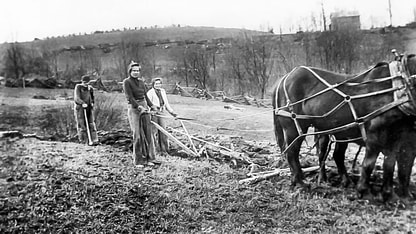 The seed catalogs have begun arriving and there’s excitement in the air! The miracle of planting a tiny little thing which can yield a crop and sustain our families is not to be taken for granted (even if you’ve done it all your life). Here in the suburbs, I’m currently cornered into trying to “farm” in deck containers and tiny side gardens camouflaged as flower beds with deer fencing. My love of gardening began unconventionally as a little girl collecting pieces of colorful broken glass from the soil. I was an Appalachian beachcomber searching in a dirt sea. The story began when my grandpa was a young man and their house burned down when an oil lamp got too close to the wallpapered wall. Fortunately, nobody got hurt but tragically they lost everything. And four generations later the plot where the house once stood became our garden, and the soil would offer up treasures of broken glass…the best had flower designs! When dad plowed, it was a glorious event. Who needs a shopping mall when you have a garden full of broken glass! Mom has recorded a couple noteworthy family accounts of plowing. I’m sure many families’ ancestor- stories parallel our own. My great grandpa John Balli got his wife as a result of plowing. The Hellers lived on the adjacent farm and John would go help old man Conrad Heller plow his fields. Additional motivation to him being neighborly was the fact that Conrad’s lovely daughter Hulda would come out and drive the horses while John manned the plow. The best things they planted that year were the seeds of love. John and Hulda got married and the rest as they say is history. In the photo, we see John, then an older man plowing with his and Hulda’s daughters. Observers could see his diligent practice of following behind and removing troublesome rocks with a stick. Plowing was necessary for survival back in the day so it’s understandable how we have another related incident. During the Civil War, when great grandpa Albert Harris was a young boy, he was helping his father plow the steep hillside. He drove the oxen while his dad, James, pushed down hard on the plow handles. They took a break and spoke to a neighbor carrying a sack of corn to the nearby grist mill to get it ground into cornmeal. Suddenly their peaceful break was interrupted by a group of soldiers going down the road across the valley. The neighbor got scared and ran which enticed the soldiers to begin shooting at him. James realized it was better to pretend not to be afraid and just keep plowing! With bullets whizzing past them, he kept saying to his son, “Drive ‘em up, Albert! Drive ‘em up!” The soldiers came across and asked where the man was and when the Harris fellows said he’d gone into the woods, the soldiers gave up their pursuit and simply cut his dropped bag of corn and scattered it. In conclusion, there is a life lesson from each of these three stories. Firstly, when the Harris house burned they owned a safe for important things, but the door was left ajar and everything was burned. It seems prudent to protect what is valuable in our morals, as even the slightest crack left open can destroy it all. Secondly, just like Grandpa John working the soil on Balli Mountain, life is full of “rocks” that can hinder the growth of plants which can produce good fruit…remove them diligently. And lastly, when we are scared, tired, or discouraged, we need a Father who tells us to keep moving forward. In Luke 9:62, Jesus said about following Him, “No man, having put his hand to the plow, and looking back is fit for the kingdom of God.” Be all in. Or in other words, “Drive ‘em up, Albert! Drive ‘em up!” |
Janet Cowger- FliegelArchives
July 2024
Categories |


 RSS Feed
RSS Feed